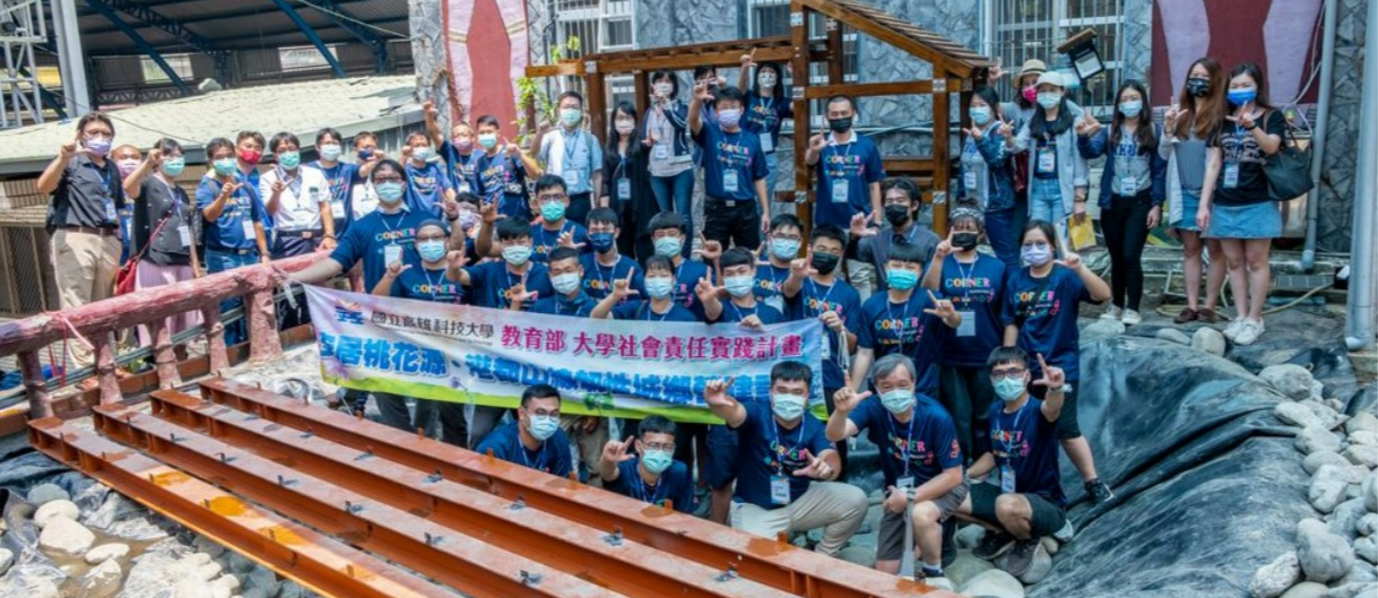Living in a Peach-Blossom Xanadu • A Resilient Township Transformation Project for Kaohsiung Mountain Areas


 Current LocationLiving in a Peach-Blossom Xanadu • A Resilient Township Transformation Project for Kaohsiung Mountain Areas
Current LocationLiving in a Peach-Blossom Xanadu • A Resilient Township Transformation Project for Kaohsiung Mountain AreasLearning from the Land and Building a Symbiotic Community
Creating a Safe Environment for Duona Elementary School
Duona Elementary School is adjacent to a steep mountain wall whose ground slopes downward into the school. Although there is a row of tall hoop pines left to the campus, the curved upward trees indicate signs of land slippage.
In the second year of the "Living in a Peach-Blossom Xanadu: A Resilient Township Transformation Project for Kaohsiung Mountain Areas", the interdisciplinary team from NKUST Department of Construction Engineering, Department of Industrial Design, and Department of Cultural and Creative Industries once again visited Duona Village in Maolin District to enable community empowerment in practice, discussing and building ecological pools with the teachers and students of Duona Elementary School.
Our "cloud disaster prevention and monitoring" team first conducted a campus environment site assessment. After assessment, the team decided to install an "electronic tiltmeter" that would adopt an IoT concept and implement cloud-based monitoring, to display the structures' site stability in real-time, and to provide first-hand disaster prevention and warning functions. In the future, whenever Maolin District is faced with strong winds and torrential rains, teachers and students of Duona Elementary School can check whether the surrounding environment is safe through their phones.
Constructing Vibrant Ecological Pools in the Campus
Upon Duona Elementary School's invitation, the "Humanitarianism architecture - Corner Team" conducted a campus site selection and decided to build Maolin District's second campus ecological pool, and to expand the ecological corridor with educational significance of sustainable development. The whole school participated in the discussion, and the students' parents also eagerly looked forward to the project. With the ingenuity of all the participants, a wooden structure with local characteristics and thus integrated into the whole environment was designed and set up at the entrance of the school, so that the space around the ecological pool can become a physical educational environment field for students to observe hydrophytes.
The "Humanitarianism architecture - Corner Team" has long been involved in the community construction engineering in remote villages, emphasizing "hands-on execution" and "learning throughout the process". The team also models after local characteristics to achieve a triple win situation for "remote village development", "teaching improvement", and "empowerment".
During this build-for-need engineering project, activities from site assessment, design to construction were all conducted by students. In addition to the Ministry of Education USR program resources, and NKUST's feedback and cultivation resources, the project also received responses from many enterprises and alumni of the Department of Construction Engineering this year. Ben Rong Tan (譚本榮), Chairman of Huachou Construction (華洲營造), and alumnus of the Department of Construction Engineering, made an open appeal and called on the companies of Huachou Construction, Hoco Engineering & Commercial Co., Ltd. (華麒工程), The One Technology (玉簧科技), Lihong Ready Mixed Concrete Co., Ltd. (立竑預拌), Weida Construction (韋達營造), and Shunfali Industrial Co., Ltd. (順發利實業) to join hands in sponsoring the project, not only to help the indigenous people in their hometown, but also to set an example for the junior students.
A Friendly Environment for Local Creation
The core value of "Living in a Peach-Blossom Xanadu: A Resilient Township Transformation Project for Kaohsiung Mountain Areas" emphasizes "Environmental Sustainability – Disaster Prevention Education", with the concept of "Resilient Township" as its main axis. With the prerequisite "settlement precedes prosperity", the team used the SDGs (Sustainable Development Goals) "Sustainable Cities and Communities" and "Climate Action" as guidelines. Combined with studies and researches, the project can assist local communities in front-end operations, such as disaster prevention assessments and planning, and help build the foundation for local development goals.
The project aims to align with preventive strategies for domestic natural disaster hazard potential areas and international critical issues, to cultivate interdisciplinary talents with "social practice competence" and "international mobility", further realizing the educational vision of university social responsibility. Thus, a series of courses focusing on "Disaster Prevention and Planning" were drawn up accordingly.
In order to allow students and teachers to take root in local communities, the curriculum includes introductory courses on plant and animal ecology, energy sustainability, and aerial photography investigation, along with such activities as humanities and cultural surveys and cultural inheritance. Through course practice, the curriculum helps students appreciate the beauty of indigenous cultures and the value of ecotourism, while following SDGs.